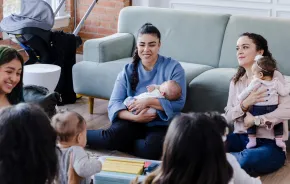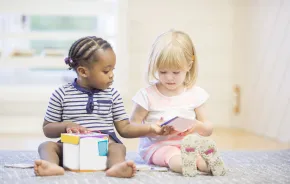
"I can't imagine what it's like to be a kid going through this time and trying to make sense of it all." My husband and I have expressed this thought many times over the last couple of months and I've heard the same from several friends and colleagues.
Everything our girls have known in their lives is disrupted — daily routines, school, sports, activities, time with friends. How do we support them during this uncertain time? How do we help them continue to build relationships, explore interests, discover new things, all while coping with the unknown?
To get some advice, I reached out to Lily Hilen, a therapist with Aspen Counseling and Family Support.
She offered these six things you can do; read the full interview below.
-
Check in regularly and give her a chance to share what she is feeling.
-
Encourage connections with friends and family.
-
Let her know you're paying attention.
-
Find creative ways to participate in activities and pursue interests.
-
Explore new interests; feed off her curiosity and passions.
-
Minimize expectations and emphasize self-care.
This interview was originally published by Her Guide.
We are all in a state of uncertainty right now, but how is this crisis impacting our girls in particular?
Lily Hilen: Girls can't always articulate all the loss they're feeling; we're all going through the stages of grief and loss at any given moment. These feelings can be complicated by worry and concern for our safety and our futures, which can increase anxiety and depression for adolescents and teens.
Developmentally at this age, there's an emphasis on identity, growing autonomy, and body changes and hormonal shifts. There is also increasingly intense social-emotional learning that takes place during the adolescent and teen years.
Girls are learning who they are in terms of their own interests, talents and abilities. Much of this growth happens within the context of social relationships and social influence. Seeking support from peers with whom they can connect via their social groups is vital to their evolution into young women. Pause and isolation for months during a girl's life can feel more significant and harder, given their smaller worlds and limited experience. You only get one sixth-grade year, for example, but you can often plan another vacation.
How can we, as adults, acknowledge and support those feelings?
Check in regularly and give her a chance to share what she is feeling. If you find she is having trouble expressing herself, it can be helpful to provide some words, feelings and thoughts. It's a way to let her know she's not alone in her experience. Sharing your feelings with her in a developmentally appropriate manner is a way to potentially open the door while keeping emotional boundaries in place, so as not to overwhelm her.
What if she doesn't want to talk and seems disengaged or afraid?
Let her know the door is open, and, again, lead with your own experience, and with empathy and compassion. Give her examples of times as a kid when you were worried, or when things weren't what you hoped or planned.
You can't force her to share, but you can let her know it's safe to be open with you. Pick an activity you both like — a board game, basketball, a walk, painting nails, etc. — and ease into what's different now. Talk about the things you miss most, or how you miss your own friends, activities, routine, etc.
Let her know the things your family is doing are intended to keep her safe and that we, as places and people, have endured hard stuff, and we will get through this. Social distancing and being cautious are things we can control and do for the greater good, which can appeal to the intrinsic social motivations kids have.
Girls need to know that we adults are human and experience the same emotions and feelings of uncertainty. But also, that as adults, it's our job to do our best to keep her safe and feel considered and loved.
At this age, friendships and activities are such a crucial part of a girl's development and discovering herself. What are some ways to continue to engage her interests and build relationships while at home?
We're lucky to live in a time of technology, so online meetings are a great way to continue to build friendships. Encourage these meetings with friends, schedule a regular meeting time, and make them part of her new routine. At this age, motivations are often socially driven.
Meetings are great, but they don't need to be in groups unless it's a trusted group. It could be with friends, family, and one on one. It could be with friends from school or dance class or a sports team. Varying the contexts of friendships can help expand her world a bit.
The goal is to feel as much warmth and support via the screen as possible. Even a text or phone call to check in on a friend or loved one can mutually feel really nice.
Of course, you want to avoid any unhealthy or hurtful dynamics carrying over via this format, so checking in with your girl and speaking to parents of friends can help mitigate that. Letting her know you're paying attention is important. Parents leading activities or discussion topics for the kids during these meetings can be fun too and lessen the pressure. A book or TV series club, where friends chat about what's happening every week, can create more meaningful conversations and connections.
Keeping access to news and social media monitored and limited can help mitigate anxiety and catastrophic thinking. Even apps like TikTok and Instagram often post political and pandemic-related content; those ideas can contribute to a girl's worry and anxiety. It's important to continue to monitor and set limits on technology and practice digital wellness.
How can girls continue to pursue their interests and activities?
So many activity organizations have gotten creative and provided opportunities for kids to stay engaged from afar. I've seen track and field and athletic strength training Zoom meetings, dance and cheerleading meetups, and even theater groups having rehearsals via Zoom. Many of our girls' regular activities, if you investigate or check in with those with whom you typically affiliate, have some version available online.
It can also be a time to explore other options in which your girl wouldn't normally participate. Consider things such as arts and craft classes, virtual museum tours, audio books, support groups, mindfulness and yoga, exercise classes, therapy. Also, delivering groceries to an elderly neighbor, sending a note and small gift to a friend, dropping off food at the food bank, etc. Helping and service opportunities can be led by you and can provide a sense of grounding, connection and gratitude.
Keep it bite-sized and feed off their curiosity and interests. Make it less about pressuring your girl to achieve or accomplish during this time.
How important is routine during this time?
Creating some structure around imperative things such as social time, moving the body, getting fresh air, school, chores, those types of things, but keeping the expectation and motivational mindset to a minimum. Strict timing and schedules don't work for a lot of girls this age. This time is a time of trauma, grief and fear for us all, so we have to treat it carefully and minimize our expectations of ourselves and each other and keep caring for self a priority. It's all meant to lessen anxiety and find some opportunities for growth in these crazy times.
Are there any helpful resources you've come across that you can suggest?
Checklists and exercises can be helpful to help with grounding, being present and lessening anxiety. These can be personalized to individuals and families and become a part of a daily or weekly practice.
There's a list of six daily quarantine questions that came from movement photographer Brooke Anderson.
- What am I grateful for today?
- Who am I checking in on, or connecting with, today?
- What expectations of "normal" am I letting go of today?
- How am I getting outside today?
- How am I moving my body today?
- What beauty am I either creating, cultivating or inviting in today?
Look for ways to shift your focus and energy towards things within your control versus things out of your control. This mindset can help you find a sense of grounding and purpose. The Counseling Teacher offers a diagram that you can copy and personalize and possibly change as time goes on.











